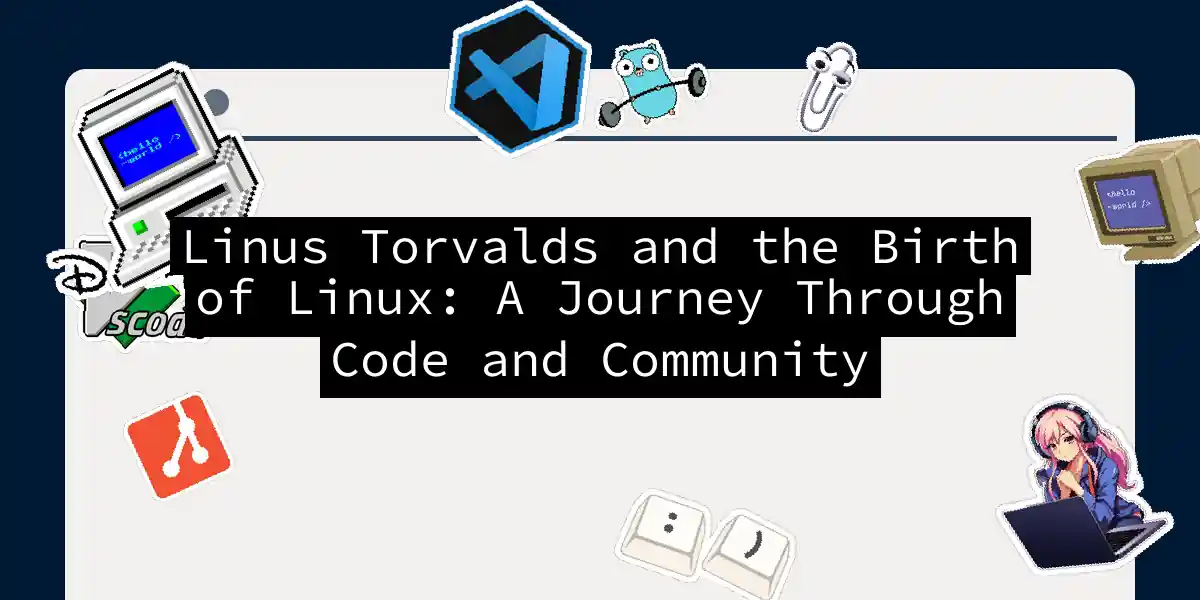The Genesis of Linux
In the world of software development, few names resonate as strongly as Linus Torvalds, the creator of the Linux kernel. Born on December 28, 1969, in Helsinki, Finland, Linus’s journey into the heart of computing began early, setting the stage for a revolution that would change the face of technology forever.
Early Beginnings
Linus’s fascination with computers started when he was just 10 years old, thanks to his grandfather’s Commodore VIC-20. This early exposure sparked a curiosity that would drive him to become one of the most influential figures in the tech world. By the time he was 11, Linus was already dabbling in programming, laying the groundwork for his future endeavors.
The University Years and the Birth of Linux
In 1988, Linus enrolled at the University of Helsinki, where he delved deeper into computer science. It was during this period that he encountered the GNU Project and was inspired by Richard Stallman’s vision of free software. However, it was his dissatisfaction with the MS-DOS operating system on his new PC that prompted him to create something better.
In 1991, Linus began working on a Unix-like operating system, which he initially called “Freax” (a combination of “free,” “freak,” and the letter X to indicate it was a Unix-like system). However, his friend Ari Lemmke, who administered the FTP server where the kernel was first hosted, named the directory “linux,” and the name stuck.
The Open Source Philosophy
Linus’s decision to make Linux open source was a pivotal moment in the history of software development. By releasing the source code, he allowed anyone with the necessary skills to modify and improve the system. This approach not only fostered a community of developers but also ensured that Linux could evolve rapidly and adapt to various needs.
The Rise of Linux
By 1994, the first version of the Linux kernel, version 1.0, was released. This marked the beginning of a journey that would see Linux become a cornerstone of modern computing. From powering supercomputers to running on embedded devices and mobile phones, Linux’s versatility and reliability have made it a favorite among developers and users alike.
Git and Beyond
Linus’s impact on software development extends beyond Linux. In 2005, he created Git, a version control system that has become indispensable in the software development community. Git’s ability to manage code repositories efficiently has revolutionized how developers collaborate and manage their projects.
Personal Touches and Quirks
Linus is not just a brilliant programmer; he’s also a man with diverse interests. He loves scuba diving and has even developed a dive logging tool called Subsurface. This tool, like Linux, is open source and reflects Linus’s commitment to community-driven projects.
Challenges and Growth
Linus has faced his share of challenges, including criticism for his behavior on the Linux kernel mailing list. In 2018, he took a break to work on his behavior, acknowledging that he needed to improve his interactions with the community. This move was a testament to his commitment to creating a positive and inclusive environment for developers.
Legacy and Impact
Today, Linus Torvalds is recognized globally for his contributions to software development. He has received numerous awards, including the Millennium Technology Prize and the IEEE Computer Society Computer Pioneer Award. His work on Linux and Git has inspired countless developers and has played a crucial role in shaping the modern tech landscape.
Conclusion
Linus Torvalds’s journey is a testament to the power of innovation and community. From his early days as a curious programmer to his current status as a leader in the tech world, Linus has shown that with determination and a willingness to collaborate, even the most ambitious projects can become a reality. As we continue to navigate the ever-evolving world of software development, Linus’s story serves as a reminder of the importance of open source, community, and continuous improvement.
So the next time you boot up your Linux machine or use Git to manage your code, remember the man behind these tools—a man who not only changed the world but also continues to inspire new generations of developers.
